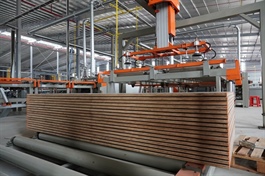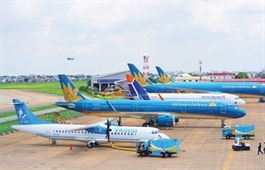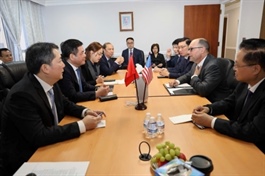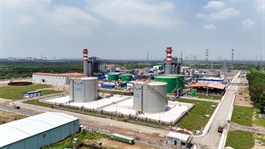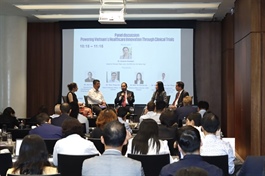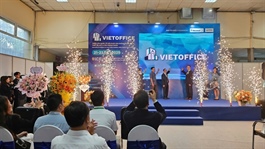Agriculture players lean on tech to raise productivity
Agriculture players lean on tech to raise productivity
Agricultural groups are boosting the utilisation of crop breeding technology to develop high-quality varieties, which will help improve both productivity and competitiveness.
The PAN Group and the Vietnam Academy of Agricultural Sciences on May 9 signed an MoU to extend their collaboration, which includes human resource development, research and technology transfer, fostering international relations and partner connections, and providing scholarships for students.
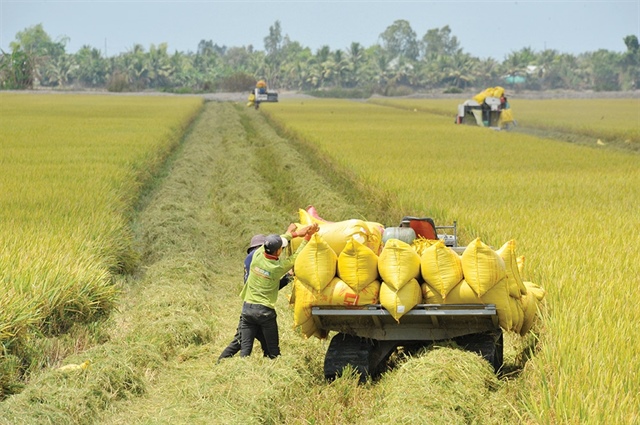
More investment into research is leading to enhanced outcomes for the industry, Photo: Le Toan |
On the same day, Vinaseed Group, a member of The PAN Group, signed an MoU with the Mekong Delta Rice Research Institute to collaborate on research, development, demonstration, and testing of varieties, as well as product development and technical advancement transfer.
These agreements were made during an international scientific conference on crop breeding technologies in Hanoi, which aimed to leverage collective efforts to study and develop new breeding methods that produce high-quality crop varieties resilient to climate change.
“Breeding crop varieties is the foundation of agriculture. Pioneering crop breeding is not only the responsibility of the industry but also a national mission related to seeds and food security,” said Nguyen Thi Tra My, CEO of The PAN Group. “We consistently identify this as a strategic focus. To excel in this area, close collaboration between businesses and scientists is indispensable.”
Without technological innovation, genetic resources, and strong research-application linkages, progress remains limited, My added. “That’s why we are actively investing in cutting-edge solutions like rapid breeding, gene editing, AI, and biotechnology, translating strategy into concrete action to secure long-term competitiveness,” My said.
According to the Vietnam Seed Association (VSA), Vietnam’s crop production sector has achieved remarkable results in recent years, especially in 2024, when agricultural export turnover reached $62.5 billion, including a record nine million tonnes of rice.
Over 1,000 crop varieties were recognised as being cultivated in Vietnam last year, including 455 rice varieties, over 200 corn varieties, and numerous varieties of fruit, industrial crops, and vegetables. However, to meet the goals of sustainable agricultural development, climate change adaptation, and international competitiveness, innovation in breeding technology remains critical.
The VSA reports that gene transfer technology has been applied to various crops, incorporating genes for brown planthopper resistance, bacterial blight resistance, fungal resistance, vitamin A synthesis, virus resistance, and early ripening.
Leveraging AI, gene convergence, and gene editing in seed selection can drive innovation in Vietnam’s agricultural sector. By fostering collaboration between research facilities and corporations, these technologies can optimise breeding, production, and processing, enabling high-value, sustainable products and strengthening Vietnam’s domestic and global agricultural brands, the VSA explained.
Businesses involved in research and development have significantly contributed to increasing the pool of new varieties for production, enhancing the productivity and output of crop seeds nationwide.
Data from the Department of Crop Production under the Ministry of Agriculture and Environment last year noted that 60 per cent of certified seed varieties in circulation come from businesses and individuals, 31.7 per cent from institutes, centres, and departments, and the rest from foreign-invested enterprises.
According to the development strategy for Vietnam’s crop seed industry from now to 2035, efforts will focus on enhancing scientific and technological capacity in seeds, including gene conservation and utilisation, breeding research, and seed industry technology. By 2035, Vietnam’s agriculture will establish key seed production regions while creating good conditions for large enterprises like Vinaseed, Thai Binh Seed, and Nafood to research and produce crop seeds.
Nguyen Dinh Trung, deputy general director of Vinaseed, said businesses have certain advantages in this field.
“Some enterprises with substantial financial resources invest in infrastructure and equipment for research. They are fully independent in research, and proactively connect with markets and consumers, as many businesses align closely with market demands,” Trung said.
“Businesses flexibly collaborate with research institutes, universities, farmers, and especially foreign organisations for breeding cooperation. However, they also face challenges such as inconsistent policies, a lack of valuable gene sources, risks from market and weather fluctuations, competition, inadequate infrastructure, and, in particular, a shortage of high-quality human resources for researching and developing high-quality crop varieties. Thus, collaboration between businesses and institutes and universities is a solution to take advantage of the parties,” Trung added.
- 14:56 22/05/2025





